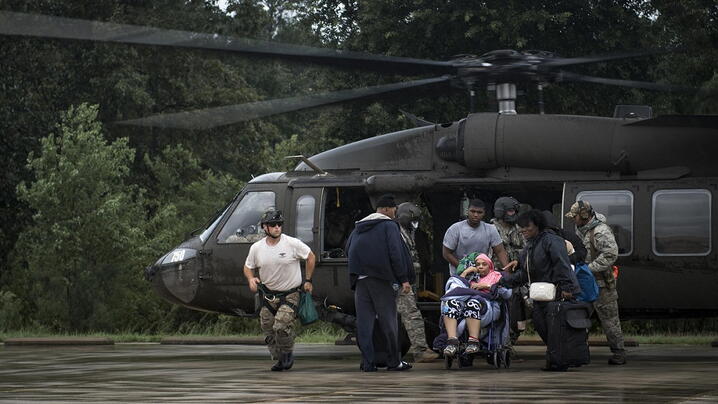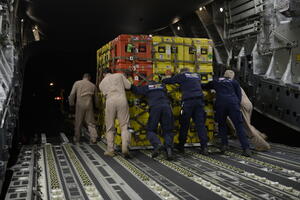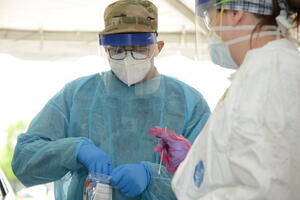
As the weekend approaches, your direct report reminds you that he’ll be out of pocket for the next two weeks at annual training with the National Guard. Or was it the Reserves? Is there a difference? Either way, you’re now short a valued team member for two whole weeks. What are these veterans in local government doing while they’re gone?
The National Guard and Reserve components form a critical portion of the U.S. military. Most personnel wear the uniform part-time–usually a minimum of “one weekend a month, two weeks a year”–and have nonmilitary, full-time professions. Many serve in local governments across a variety of roles, from entry-level positions to city managers.

However, what these valued team members do while on military duty is often an enigma. To start, it helps to clarify the difference between the Reserves and National Guard:
Reserves
- 100% federal.
- All armed services have a Reserve component, except the Space Force (so far).
- Primary focus on supporting the active-duty service components.
- May be activated for major domestic emergencies (i.e., major hurricanes, COVID, etc.) or international events (i.e., conflict, humanitarian response, etc.).
National Guard
- Commanded by the governor unless directly federalized by the president of the United States.
- Only Army and Air Force have aligned National Guard entities.
- Dual-mission focus–supports state operations and federal missions.
- May be activated by the governor for local emergencies or events (i.e., storms, local pandemic relief, mass-spectator events, etc.) and the president for nationwide or international support.
What Employees Do While Training or Activated
Despite differences in how their units are utilized, Reservists and National Guard personnel all train throughout the year to ensure proficiency in their military occupations. These training periods vary by job and unit, but generally occur during:
- Monthly training over the weekend.
- An annual training period that usually takes place over the course of a few weeks.
- Occasional exercises, technical training, or professional military education.
Training will vary based on an individual’s occupational responsibilities. These skills might include welding, field medicine, flying aircraft, project management, and many other functional areas. Regardless of their military profession, your Reservist or Guard personnel will also receive training in:
- Teamwork.
- Management.
- Leadership Concepts.
- Critical Thinking.
These opportunities may occur on-the-job or in formal training settings in person or online. I can attest from personal experience that some employees are taking professional military education courses after completing a workday in service of your community.

Additionally, Guard or Reserve service members may be activated for a variety of real-world missions that their unit supports. No matter the scenario, they will be working in high-stress environments and with a diverse group of peers, fortifying skills and creating lifelong personal connections.
Actively Serving Veterans Add Value to Local Government
Like the rest of the veteran population in local government, your actively serving Guard members and Reservists bring their experiences from the military to your community. The only difference is that these employees–at the cost of time spent away from their full-time job–continue to build upon the unique benefits that uniformed service provides.
While your employee is serving in uniform, the Uniformed Services Employment and Reemployment Rights Act (USERRA) provides protection from discrimination or retaliation related to his or her military obligation, as well as provisions for reemployment, retention of seniority, and other benefits. In addition, many states and local governments have enacted laws or policies that provide additional benefits to staff in the Reserves or National Guard, including paid time off for military service. If you haven’t done so recently, take the time to review your community’s policy for such benefits.
The time away from your community is an investment in both the employee and the skills he or she brings to the table day-to-day. Through my own experience as a member of the Air National Guard, I’ve been lucky to see this prove true for staff who:
- Hone their ability to think creatively and act with confidence in challenging environments. One of the personnel I supervised as an Air Guard officer (while serving full time in local government) was a public safety professional for a county government. She credited her training and experience in the Guard with improving skills necessary to succeed in the high intensity settings she navigates in service of her community.
- Grow as leaders and managers in uniformed service while sharpening their skills in local government. After five years of active-duty military service, I transferred to the Air National Guard and joined local government full time. I needed to learn the ropes of my new profession before taking on management responsibilities, but was able to serve in a command position with my Guard unit. This opportunity allowed me to continue growing as a supervisor and left me better prepared to take a management position in my current community.
- Gain new perspectives to how other government entities, communities, or the private sector do business through professional networks, training, or missions. While activated in support of a state emergency management agency early in the pandemic, I served with an Army National Guard member who was a full-time school district employee. After our activation, he returned to his district better equipped to support continued pandemic response, as well as future emergencies because of his knowledge of state practices.
The next time your employee leaves for a week of training, gets called up to support a weather event, or is activated to aid a foreign ally, it’s worth remembering that–while she will be missed–she’ll return to your community with new skills and perspectives.
Myles Tucker is support services manager for Needham, Massachusetts, and an officer in the Massachusetts Air National Guard. He also serves on the ICMA Veterans Advisory Committee. The views represented in this post are his own and do not reflect those of the Department of Defense, United States Air Force, or Air National Guard.
Find more ICMA Veteran Resources
New, Reduced Membership Dues
A new, reduced dues rate is available for CAOs/ACAOs, along with additional discounts for those in smaller communities, has been implemented. Learn more and be sure to join or renew today!
